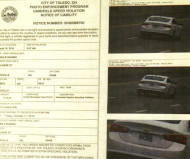11/13/2019
Ohio City Challenged For Ignoring Speed Camera LawOhio Supreme Court entertains direct challenge to the legality of Toledo speed camera administrative hearings.

Several Ohio cities have ignored a state law designed to discourage the use of speed cameras. The measure, known as House Bill 62 (view law), withholds state funding to a city that uses speed cameras by the amount of money that the jurisdictions raise through photo ticketing. The measure also gave the municipal courts sole jurisdiction over automated citations. Upon passage, cities like Dayton and Toledo ran to the lower courts to block the law's implementation.
Now a direct challenge to Toledo's actions is before the Ohio Supreme Court. Toledo wants to continue having administrative hearing officers who answer to the mayor decide guilt or innocence in speed camera cases. Motorist Susan D. Magsig and her attorney Andrew R. Mayle insist Toledo, as of July, lost the authority to use such appeals because the newly amended Ohio Code Section 1901.20 gives "exclusive jurisdiction" to the municipal courts for these alleged violations, but the city will not allow her access to that court. Magsig has an administrative hearing set for her photo ticket on November 19, but she points out the hearing has no basis in law.
"Jurisdiction is patently and unambiguously lacking except in municipal court," Mayle wrote. "Therefore, relator requests this court to issue... a writ of prohibition preventing Toledo from filing tickets or notices... outside the municipal court's exclusive jurisdiction."
With this framing of the case, Magsig will draw support from the state attorney general, who is charged with defending state laws. On the other side of the issue, Toledo law director Dale R. Emch pointed out that the Lucas County Court of Common Pleas issued a preliminary injunction in the city's favor granting the city full legal permission to continue using administrative hearings. Mayle pointed to the state constitution as giving the legislature, not a local judge, sole authority to decide where legal cases like photo tickets should be heard. Such a ruling, in addition, does not bind the Supreme Court, either.
"The wisdom behind the policy -- protecting peoples' day in municipal court in cases brought by the government -- seems reasonable," Mayle argued. "But even if not, the jurisdiction of inferior courts is strictly a matter for the General Assembly and is hence beyond judicial review.... Fundamentally, this court's seat atop this state's judicial hierarchy means that this court is not limited by trial court cases."


